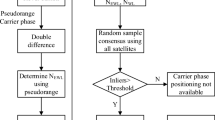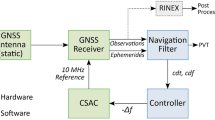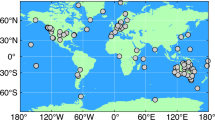Abstract
Global position system (GPS) has become a satellite based critical international navigation and timing system. Navigation has a significant effect in our daily life. Hence, such a commonly used system is an interesting goal for criminal utilizing. Trusting GPS navigation, need spacious knowledge to inadvertent and intentional interferences. The position deviation in GPS, which is subject to spoofing, is analyzed in this paper. Serious research into spoofing has been carried out in recent years. One of the basic requirements and major challenges in designing anti-spoofing methods and evaluating a successful GPS spoofing countermeasure is collection of actual spoofing data used to verify the proposed protection algorithm. Since actual spoofing data is acquired through an expensive spoofer-receiver device, preparing genuine spoofing data without expensive spoofing devices, including extra software or hardware, can be helpful in the development of anti-spoofing studies. In this paper, after providing a refined assessment of existing approaches, a new practical and low-cost technique is proposed that helps to generate a set of spoofing data only with the employment of software receiver and a set of real GPS measurements. In this way, a new kind of spoofing data is resulted by utilizing delay and mixing procedure. This data will be generated in victim receiver antenna, if a spoofer-receiver device is used in practice. After explanation of the spoofing algorithm, its influence on the GPS receiver is studied in details, and then validation of proposed method is proved by appropriate tests.












Similar content being viewed by others
References
Ferguson, N., & Schneier, B. (2003). Practical cryptography. New York: Wiley.
Mosavi, M. R. (2006) “Frequency domain modeling of GPS positioning errors”, Proceedings of the 8 th International Conference on Signal Processing, Vol. 4, (pp. 1–4).
Warner, J. S., & Johnston, R. G. (2003). GPS spoofing countermeasures (Vol. 10, pp. 22–30). Los Alamos National Laboratory: Vulnerability Assessment Team.
Mosavi, M. R. (2006). Comparing DGPS corrections prediction using neural network, fuzzy neural network and Kalman filter. Journal of GPS Solutions, 10(2), 97–107.
Mosavi, M. R., & EmamGholipour, I. (2013). De-noising of GPS receivers positioning data using wavelet transform and bilateral filtering. Journal of Wireless Personal Communications, 71(3), 2295–2312.
Mosavi, M. R., Azad, M. S., & EmamGholipour, I. (2013). Position estimation in single-frequency GPS receivers using Kalman filter with pseudo-range and carrier phase measurements. Journal of Wireless Personal Communications, 72(4), 2563–2576.
Mosavi, M. R., Nabavi, H., & Nakhaei, A. (2014). Neural technologies for precise timing in electric power systems with a single-frequency GPS receiver. Journal of Wireless Personal Communications, 75(2), 925–941.
Cheng, X. J., Cao, K. J., Xu, J. N., & Li, B. (2009) “Analysis on forgery patterns for GPS civil spoofing signals”, Proceedings of the 4 th International Conference on Computer Sciences and Convergence Information Technology, (pp. 353–356).
Warner, J. S. & Johnston, R. G. (2002) “A simple demonstration that the global positioning system (GPS) is vulnerable to spoofing”. Journal of Security Administration, 25, 19–28.
Tippenhauer, N. O., Popper, C., Rasmussen K. B., & Capkun S. (2011) “On the requirements for successful GPS spoofing attacks”, Proceedings of the 18 th ACM Conference on Computer and Communications Security, (pp. 75–86).
Nighswander, T., Ledvina, B. Diamond, J. Brumley, R., & Brumley, D. (2012). GPS software attacks. In Proceedings of the 2012 ACM conference on Computer and communications networks-security and protection (pp. 450–461).
Ledvina, B. M., Bencze, W. J., Galusha, B. & Miller, I. (2012) “An in-line anti-spoofing device for legacy civil GPS receivers”, Proceedings of the 23 rd International Technical Meeting of the Satellite Division of The Institute of Navigation, (pp. 689–712).
Montgomery, P. Y., Humphreys, T. E., & Ledvina, B. M. (2009) “Receiver-autonomous spoofing detection: Experimental results of a multi-antenna receiver defense against a portable civil GPS spoofer”, Institute of International Technical Meeting of the Institute of Navigation, (pp. 1–7).
Jahromi, A. J., Broumandan, A., Nielsen, J., & Lachapelle, G. (2012) “GPS vulnerability to spoofing threats and a review of anti-spoofing techniques”. International Journal of Navigation and Observation, 2012, 1–16.
Humphreys, T. E., Ledvina, B. M., Psiaki, M. L., O’Hanlon, B. W., & Kintner, P. M. (2008) “Assessing the spoofing threat: Development of a portable GPS civilian spoofer”, Proceedings of the 21 st International Technical Meeting of the Satellite Division of The Institute of Navigation, (pp. 2314–2325).
Papadimitratos, P., & Jovanovic, A. (2008). GNSS-based positioning: Attacks and countermeasures. IEEE Military Communications Conference, 1–8.
Jahromi, A. J., Lin, T., Broumandan, A., Nielsen, J., & Lachapelle, G. (2012) “Detection and mitigation of spoofing attacks on a vector-based tracking GPS receiver”, International Technical Meeting of The Institute of Navigation, (pp. 3–8).
Nielsen, J., Broumandan A., & Lachapelle, G. (2010). Spoofing detection and mitigation with a moving handheld receiver. GPS World Magazine, 21(9), 27–33.
White, N. A., Maybeck, P. S., & DeVilbiss, S. L. (1998). Detection of interference/jamming and spoofing in a DCPS-aided inertial system. IEEE Transactions on Aerospace and Electronic Systems, 34(4), 1208–1217.
Shepard, D. P., & Humphrey, T. E. (2010). Characterization of receiver response to spoofing attacks. GPS World, 21(9), 27–33.
Jahromi, A. J., Broumandan, A., Nielsen, J., & Lachapelle, G. (2012). GPS spoofer countermeasure effectiveness based on signal strength, noise power and C/No observables. International Journal of Satellite Communications and Networking, 30(4), 181–191.
Wen, H., Huang, P. Y. R., Dyer, J., Archinal A., & Fagan, J., “Countermeasures for GPS signal spoofing”, Proceedings of the 18 th International Technical Meeting of the Satellite Division of The Institute of Navigation, (pp. 1285–1290).
Cavaleri, A., Motella, B., Pini M., & Fantino, M. (2012) “Detection of Spoofed GPS signals at code and carrier tracking level”, Proceedings of the 5 th ESA Workshop on Satellite Navigation Technologies and European Workshop on GNSS Signals and Signal Processing, (pp. 1–6).
Scott, L. (2007). Location assurance. GPS World, 18(7), 14–18.
Humphreys, T. E., Psiaki, M. L., Kintner, P. M., & Ledvina, B. M., (2006) “GNSS receiver implementation on a DSP: Status, challenges and prospects”, Proceedings of the 19 th International Technical Meeting of the Satellite Division of The Institute of Navigation, (pp. 1–13).
Borre, K., Akos, D. M., Bertelsen, N., Rinder, P., & Jensen, S. H. (2007). A software-defined GPS and Galileo receiver: A Single-frequency approach. Boston: Birkhäuser.
Author information
Authors and Affiliations
Corresponding author
Rights and permissions
About this article
Cite this article
Baziar, A.R., Moazedi, M. & Mosavi, M.R. Analysis of Single Frequency GPS Receiver Under Delay and Combining Spoofing Algorithm. Wireless Pers Commun 83, 1955–1970 (2015). https://doi.org/10.1007/s11277-015-2497-9
Published:
Issue Date:
DOI: https://doi.org/10.1007/s11277-015-2497-9




